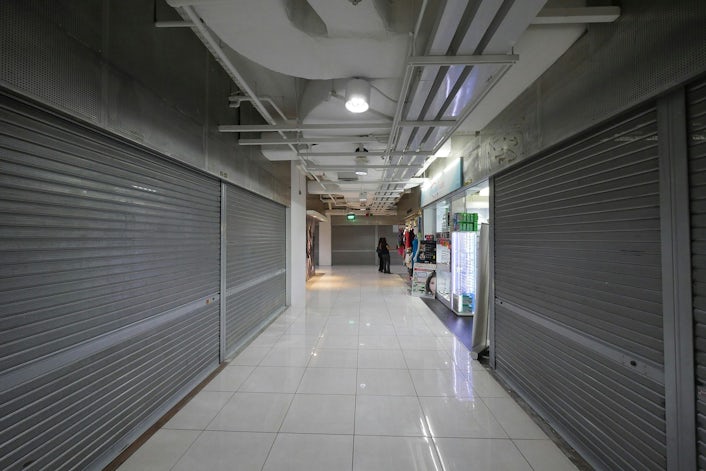
Post Covid - Singapore retail still struggling to recover
by Edmund O'Connell on Mar 5 2023
Darren Yang, a fashion store owner, was overjoyed when he opened his shop in Cineleisure Orchard, his favourite teenage hangout spot, in December 2020. The mall had been a hub for young people like him, and he had dreamed of opening his shop there.
But within two years, he watched as his neighbours leave one by one, and now his store is one of only two fashion retailers still in operation. Cineleisure Orchard was once a bustling mall with many shops and restaurants, but now it is almost deserted, with an estimated 22 tenants remaining as of Feb 2.
The emptiness of some malls on the prime shopping strip is quite striking, especially given the higher growth recorded by the retail sector last year. The shutters have also been down for several units at The Cathay mall, which closed its cineplex in June 2022.
Ethan Hsu, head of retail at real estate consultancy Knight Frank Singapore, observed that the entertainment sector was badly affected during the Covid-19 pandemic by safe distancing measures.
While many retailers have migrated to online platforms to save on rent and other operational costs, others may have relocated to prime locations at cheaper rents due to weak demand for retail space during that time.
Hsu added that when pandemic restrictions were gradually lifted in 2022, shopper footfall naturally gravitated towards the malls with a variety of shops and services that could create a better shopper experience.
It's sad to see the once bustling malls now deserted and abandoned. These malls were once a hub for young people and shoppers, but now they are empty and desolate. As more businesses move online, it's important to remember the importance of brick-and-mortar stores and the sense of community they bring.
It's heartbreaking to see these stores close down one by one, but it's crucial for us to continue to support our local businesses and keep our shopping districts alive.
According to market observers, the lack of customers in some malls along Orchard Road, Singapore's prime shopping district, is striking. This is especially surprising since the retail sector had recorded higher growth last year.
Right beside Cineleisure Orchard, the five-story Scape building was also nearly empty, with fewer than ten tenants operating. Tan Khee Hua, 72, who runs a store selling pet clothing, said businesses shut during the Covid-19 pandemic. He has been renewing his lease on a monthly basis.
Last year, Scape announced that the mall would undergo a major revamp and is set to reopen in 2024. The shutters have also been down for several units at The Cathay mall, which shut its cineplex in June 2022. A canvas that lists the mall directory and covers one of the empty shop fronts showed 23 shop listings struck out.
Ethan Hsu, head of retail at real estate consultancy Knight Frank Singapore, said The Cathay and Cineleisure Orchard were popular in the past, especially with youth and young adults. This was due to their tenant mix, which was heavily skewed towards the entertainment sector, with the cinema as the anchor tenant in both malls.
Hsu noted that the entertainment sector was badly affected during the Covid-19 pandemic by safe distancing measures. Many retailers migrated to online platforms to save on rental and other operational costs, while others could have relocated to prime locations at cheaper rents due to weak demand for retail space during that time, he said.
The retail sector started to gain traction after most Covid-19 restrictions were removed in the second half of 2022, said analysts. Edmund Tie's quarterly market performance report noted that for the whole of 2022, the Orchard and Scotts Road spaces (prime first-storey) recorded the strongest rental growth of 7.4%, followed by the fringe or suburban area (prime first-storey) at 6.7% and other city areas (prime first-storey) at 3.7%.
Lam Chern Woon, head of research and consulting at Edmund Tie, said possible factors causing high vacancy rates in any mall could include high rental rates and associated operating costs, making it challenging for retailers to sustain their businesses. According to Lam, landlords could offer flexible lease terms or even rental rebates to help retailers tide over the challenging times.
The retail sector is constantly evolving, and malls must adapt to changing consumer preferences and habits. In recent years, malls have been incorporating more experiential elements, such as themed zones, pop-up stores, and interactive installations, to create a more engaging shopping experience for consumers.
For example, Funan Mall, which reopened in 2019 after a three-year redevelopment, boasts a wide range of tech-focused stores and concepts, such as the first physical store in Singapore for global gaming giant Razer.
The mall also features a rock-climbing gym, a rooftop urban farm, and a 24-hour gym with virtual reality fitness classes.
Another example is Jewel Changi Airport, which opened in 2019 and has quickly become a popular tourist destination. The mall features a 40-meter indoor waterfall, a four-story garden with over 2,000 trees and plants, and an extensive range of dining and retail options.
The lack of customers in some malls along the prime shopping strip is quite striking given that the retail sector had recorded higher growth last year. The Covid-19 pandemic has undoubtedly taken a toll on the retail sector, with safe distancing measures and shifting consumer habits leading to lower footfall in malls.
Malls must adapt to changing consumer preferences and habits by incorporating more experiential elements to create a more engaging shopping experience for consumers. Landlords could also offer flexible lease terms or even rental rebates to help retailers tide over the challenging times.
By doing so, malls can attract a new generation of shoppers post-pandemic, with a palette of engaging shopper experiences.